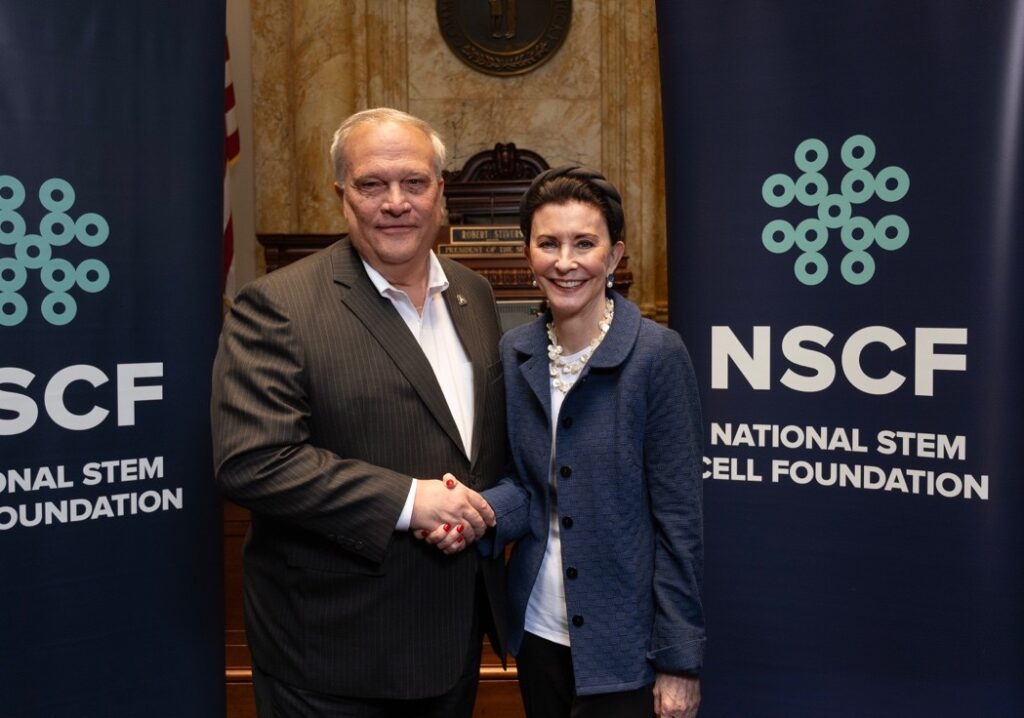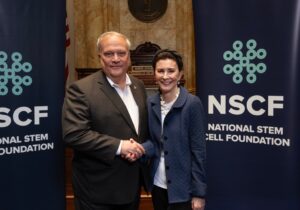Kentucky invests $300,000 in space research to find cures for Alzheimer’s, Parkinson’s and multiple sclerosis

By Melissa Patrick
Kentucky Health News
The National Stem Cell Foundation, which is based in Louisville, has been awarded a $3.1 million grant from NASA to continue research on brain cell behavior in space as a way to find treatments and cures for neurogenerative conditions, and Kentucky is investing $300,000 toward the project as part of a 10% match.
Kentucky’s portion was allocated in the 2024 legislative session in Senate Bill 1. The announcement was made Wednesday, March 26 at the Kentucky State Capitol.

Pointing to the space research Kentucky students have done at the Craft Academy for Excellence in Science and Mathematics and NASA’s presence at Morehead State University, Senate President Robert Stivers, R-Manchester, said it was easy for him and his colleagues to support this type of research in hopes of making Kentucky a hub for it.
He also pointed to how this research could impact the lives of Kentuckians who suffer from the neurogenerative diseases this research is looking at, such as Parkinson’s, multiple sclerosis and Alzheimer’s.
“One, it’s economics, but two, it’s health care,” Stivers said. “It’s for the betterment of the state of Kentucky and the poor health care indices we have. This is a potential to put those two together to help.”
In Kentucky, 81,000 people live with Alzheimer’s disease, 12,000 live with Parkinson’s disease and 5,000 live with multiple sclerosis, according to data provided by the National Stem Cell Foundation.
The grant will fund additional ground research and three more missions to the International Space Station through 2027. NSCF has already conducted six missions to the space station since 2019.
The first six missions sent 3D organoid models of the human brain, using brain cells of people with Parkinson’s disease and primary progressive multiple sclerosis, to see how brain cells are impacted by microgravity in hopes of finding a cure. The next flights will also include organoids for Alzheimer’s disease. The foundation describes organoids as “tiny 3D replicas of an organ that mimic cell behavior.”
Dr. Paula Grisanti, CEO of the foundation, said cells that are exposed to microgravity mature more rapidly than they do on Earth and the research to identify these accelerated models of cell behavior will eventually be used to find treatments and cures for Parkinson’s, MS, Alzheimer’s and other neurogenerative diseases.
“Solving the puzzle of these diseases will have a knock-on effect for these and other neurodegenerative diseases that include ALS and a number of rare childhood disorders,” she said in a news release.
Mackenzie Wallace, director of public policy at the Alzheimer’s Association, lauded Kentucky’s commitment to this type of innovative research that she said “is going to make a major difference in the lives of Kentuckians.”
Wallace noted that in addition to having more than 81,000 Kentuckians diagnosed with Alzheimer’s disease, the state also has high rates of conditions that increase the risk of developing cognitive decline, such as high rates of obesity, diabetes, heart disease and smoking.
“And so while we can do a lot of work to address some of the lifestyle changes that we are getting confirmation through research that can, you know, help slow the progression it, really, at the end of the day, it is going to come down to research and finding a cure,” she said. “This is the type of innovation that will change lives, without question. And I just hope that we’re all around long enough to see it.”